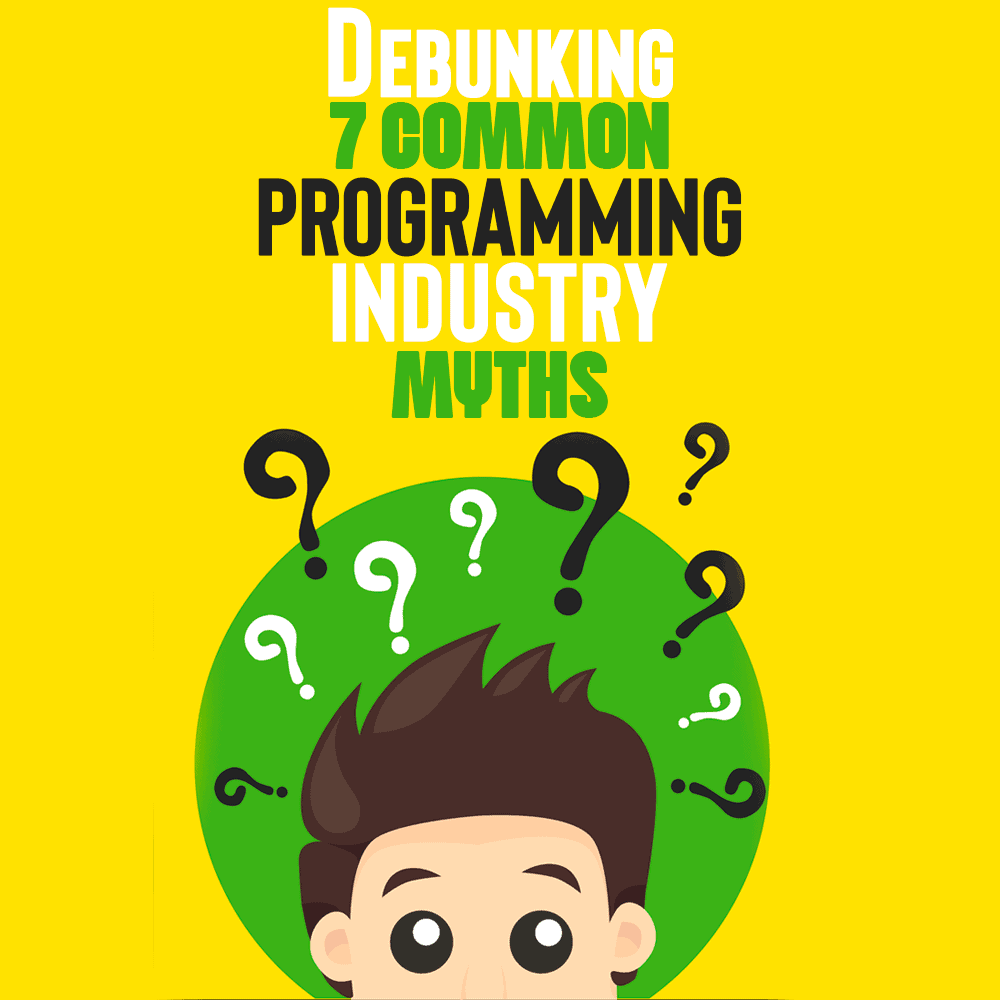
While these myths are persistent and many people believe them to be true, there is no factual evidence to support their claims. As a programmer, it is important not to let yourself be bogged down by fictional statements which ultimately shape your professional career.
To support you on your coding journey, in this article, I’m going to debunk seven popular programming myths, helping you see the truth they obscure, and so help you become a better programmer.
You Need a College Degree to Learn Code
A couple of years ago, a college degree would have been the unquestioned path to getting a programming job. However, due to the changing dynamics of the tech world, employers place a greater value on self-taught skills and practical knowledge rather than four years of a degree. Many companies have waived the compulsion of a college degree as a requirement because they want to see how well equipped the developer is to work for a particular role.
While programmers can learn the basics of coding at school, an internship will get you the hands-on experience you need to apply for a job. Smart recruiters know that dedicated developers put in that extra effort to utilize freelance resources and build a portfolio that sets them apart from competition.
Alternate options to a degree are becoming increasingly popular due to high demand. Coding bootcamps offer intensive training for aspiring programmers and are considered a solid counterpart to bachelor’s degrees. The next best option is to learn by doing. Contributing to open-source projects helps developers a great deal. Developers can polish their existing skills, learn a new technique, and even end up finding excellent mentors for themselves.
Exemption of a college degree means you can learn programming even at a later age, even if you have a totally irrelevant bachelor's degree. The takeaway here is: Not having a degree shouldn’t stop you from choosing the career you want in programming. Tech giants like Google, IBM, and Apple no longer restrict applicants by a computer degree, so why should you restrict yourself?
Coding Requires Exceptional Math Skills
The majority of people think that if they aren't good at math, they won't be able to code. But is that actually the case?
The truth is, good programmers must possess basic algebra skills that are already taught in high school. But rest assured, coding is like writing a language—not solving complex mathematical problems.
Mathematical problems usually have only one correct answer, while the same does not hold true for software development. Programmers have to think out of the box to come up with creative solutions to solve a coding problem. Moreover, programming languages are dependent on each other and share common principles. Once you master a language, it becomes easier to learn the new syntax.
So even if you had an average grade in mathematics in school, you still can be a great programmer. There are plenty of programs out there that do the math for you. It's all about finding the right resources and making them work for you.
Specializing in One Area Is Key to Coding
There is a programming myth that developers should specialize in one key language. Yet while it's smart to start off with a single language, it’s not a good idea to just stick to one.
According to experts, developers can take the T-shaped knowledge approach. What this means is that, as a programmer, your aim should be to have a broad knowledge base with at least one area of deep specialization. As a software developer, the key areas for focus are algorithms, data structures, various architectures, and back-end and front-end databases.
The advantage of establishing a strong general base is that it also gives you a fair idea of what specialization you can choose. In some cases, developers choose a specialization where they think they can excel, only to realize later it's not their piece of work. A motivated programmer should continuously work towards expanding their knowledge where they also branch out their specialization areas.
Other than the T-shaped approach, programmers should develop a valuable trait: adaptability. Recruiters look for developers who have the knack to learn skills in a short amount of time and grow according to the needs of the company. Regardless of the skills you specialize in, keep a flexible mindset targeted towards learning.
Programming Doesn't Let You Get Creative

As a programmer, you have the ability to create something out of an idea. One day you are writing code for a website, and the next, you are developing a game. Building something from the abstract requires a great deal of creativity and control—that's exactly what programming is about.
Even if you feel like you lack that creative touch, worry not! There are some simple ways to get a kick out of the monotonous coding routine programmers might spiral into. Get out of your comfort zone by learning a new language. Master an interesting, new tool to expand your skill set. And most importantly, find fun projects outside of work deadlines to keep your skills and your interest sharp.
Coding Is Just the Act of Writing Code
It is often thought that programmers spend all their time following instructions and translating ideas into writing code. However, that is not the case. Writing good code requires a series of actions that involve non-technical skills as well.
Before a good coder even starts typing the first line of code, they have to learn to read code. The reason is that reading others' code helps you think about how you might do it better and which techniques you can take away from it.
Writing code means working with other programmers, too. You might do pair programming, join a hackathon, or find a mentor. Taking part in team activities enables developers to polish their social skills as well.
Writing code is simply not just a one-step process. Programmers have to rewrite and revise the code to make it better and easier than before. Therefore, the coding process entails analytical thinking, decision making, and time managing skills—a whole lot more than just writing code.
X Is the Best Language to Learn
Perhaps the most debated topic in the programming industry is whether there is a single best language to learn. In simple words, the answer is no. The reason behind this logic is that each language has its own niche in the coding environment. As a result, recruiters even look for programmers who know a couple of languages.
Since it is not possible to strictly follow a single line of code, there is no one language entirely better than the others. You may use JavaScript for interactive cloud software, while R is considered best for data analytics. Depending on the latest trends, one language may be the rage right now and die out after some time. In order to cope with the dynamic programming market, recruiters want people who are proficient enough to learn more than just one language.
Coders Have to Memorize Syntax
There is a common notion that pro programmers have to learn code by heart. If that were true, there would only be a few star programmers out there. Lucky for you, it is not true at all. Learning syntax is a simple byproduct of learning programming. Given the number of languages out there, it's not possible to learn the syntax for every one of them—and you shouldn't try to, either.
Having a solid foundation of a language enables you to look up syntax when required. If you are well versed in a certain language, you will be able to put together the correct syntax. The best solution is to remember the useful bits of a syntax—like the basic functions and logical structures—and practice the rest.
The key here is to jot down best practices for the language you know. Even if you don't know the syntax, you can play by the rules and have the correct code.
A good programmer doesn't necessarily know the syntax by heart but knows how to develop one. Regular practice and attention to details helps a lot to get an understanding of the syntax. Like a spoken language, there are new things a programmer can learn every day and apply it to the code.
Don't Let Myths Define Your Programming Career

Instead of baseless myths, look into some insightful ideas to help you become a better programmer. As a general rule, learn and read on a regular basis. Delving deep into the tech world will help you keep up with the latest trends and techniques to grow both on a personal and professional level.
The takeaway from this article is that you shouldn’t let myths hold you back from accomplishing your potential as a coder. If you want to learn coding at 35, do it—don't stop just because of a myth that it's too late to learn code. Don’t let any of these myths stop you from having a great coding career!
